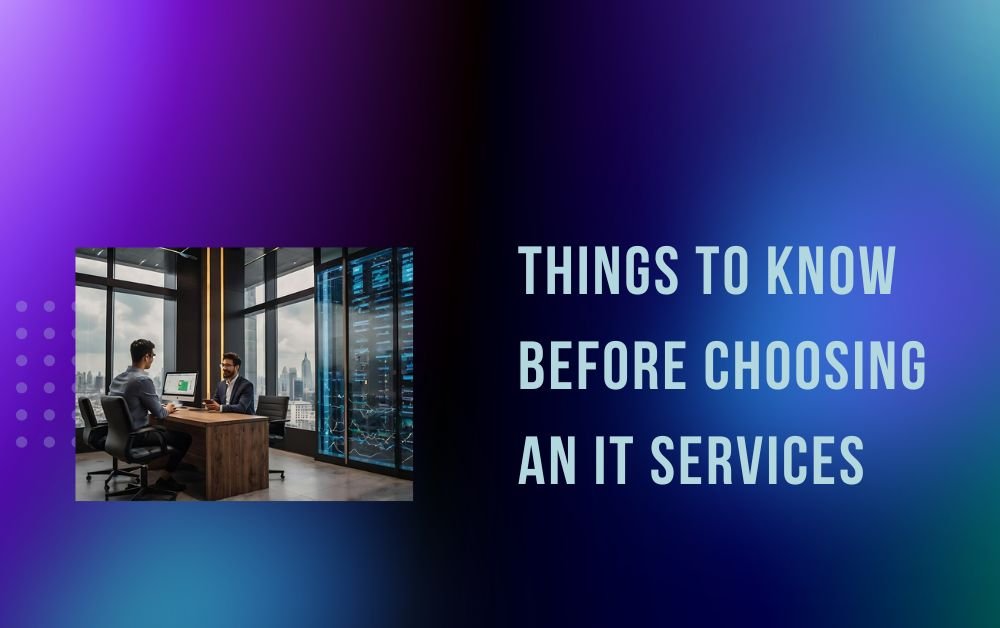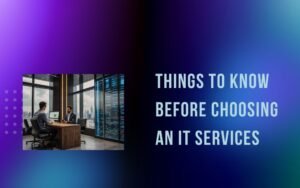Choosing the right IT services for your business is a critical decision. In today’s technology-driven world, IT services play a key role in how efficiently your business operates, how secure your data is, and how well you can compete in your market. With so many providers offering a wide range of services, it’s important to make informed decisions to ensure that the services you choose are a good fit for your business needs. In this blog, we’ll walk through the key things you should consider before choosing IT services for your company.
Understanding Your Business Needs
Assess Your Current IT Environment
Before you even start looking for an IT services provider, it’s important to understand your own IT environment. Take the time to assess your current technology setup and identify the areas where you need help. Do you need better cybersecurity measures? Is your data storage inefficient? Are your systems outdated? Answering these questions will help you understand what type of IT services you require.
Define Your Business Goals
Every business has different goals, and your IT needs should align with these objectives. Are you planning to expand your operations and need scalable IT solutions? Do you need IT support to ensure your employees have the tools they need to be productive? Defining your business goals will help you narrow down the specific IT services you need.
Know Your Budget
IT services can be expensive, and the cost varies depending on the services you choose. It’s essential to have a clear understanding of your budget before beginning your search. This will help you determine what level of IT support you can afford and ensure that you are not overspending.
Types of IT Services Available
Managed IT Services
Managed IT services provide comprehensive support for your business. This includes everything from network management to data security and IT support. A managed service provider (MSP) monitors and maintains your IT infrastructure, handles troubleshooting, and helps with long-term technology planning. This type of service is ideal for businesses that want to outsource their entire IT function.
Cloud Services
Cloud services allow businesses to store data and run applications over the internet rather than using physical servers. Cloud computing offers several benefits, including scalability, cost savings, and remote access. Cloud services are particularly beneficial for businesses that need flexibility and want to minimize the costs associated with maintaining hardware.
Cybersecurity Services
One of the biggest threats to businesses today is cybercrime. IT service providers offer cybersecurity services to protect your data and systems from hackers, viruses, and other malicious attacks. Cybersecurity services include installing firewalls, monitoring for security breaches, and providing data encryption.
Data Backup and Recovery
Data loss can be devastating to any business, which is why data backup and recovery services are critical. IT providers ensure that your business data is regularly backed up and can be quickly restored in case of an emergency, such as a system crash or cyberattack.
IT Consulting Services
If you are unsure about the best technology solutions for your business, IT consulting services can help. Consultants evaluate your current systems, understand your business goals, and recommend solutions that will help you grow and operate more efficiently. IT consulting is particularly useful when planning to upgrade systems or integrate new technology.
Evaluating IT Service Providers
Check Experience and Expertise
Not all IT service providers are the same, so it’s important to check their level of experience and expertise. Look for a provider with experience in your industry, as they will better understand your specific technology needs and challenges. Ask about their certifications and the qualifications of their technicians. Providers with certified staff will be more equipped to handle complex IT issues.
Look at Client Reviews and Testimonials
A good way to gauge the quality of an IT service provider is to read reviews and testimonials from other clients. Check online reviews, or ask the provider for references so you can hear directly from other businesses that have worked with them. Positive feedback from other clients is a good sign that the provider delivers reliable service.
Ask About Response Time
When IT issues arise, you need them resolved quickly to minimize downtime and productivity loss. Ask potential IT providers about their response times and how quickly they address issues. Some IT services offer guaranteed response times as part of their service level agreements (SLAs), ensuring that you receive timely support.
Evaluate Customer Support
Customer support is a crucial part of IT services. You want to ensure that the provider offers support when you need it most, whether that’s during business hours or 24/7. Check what types of customer support they offer, such as phone, email, or live chat. Good customer support can make all the difference when technical issues arise.
Long-Term Considerations

Scalability
As your business grows, your IT needs will change. It’s important to choose an IT provider that offers scalable services. This means that the provider can grow with you, adding more services or upgrading your systems as your business expands. Scalable IT solutions prevent you from having to switch providers in the future as your needs evolve.
Security and Compliance
Depending on your industry, you may need to comply with certain regulations when it comes to data security and privacy. Ensure that the IT provider you choose understands your industry’s compliance requirements and can help you meet them. For example, healthcare businesses must comply with HIPAA regulations, while businesses handling credit card transactions must adhere to PCI compliance standards.
Proactive Support vs. Reactive Support
Some IT service providers offer proactive support, which means they monitor your systems regularly to detect potential issues before they become major problems. This type of service can prevent downtime and ensure your systems are always running smoothly. Reactive support, on the other hand, only addresses issues after they occur. While both types of support can be useful, proactive support is typically better for maintaining a healthy IT infrastructure.
Contracts and Flexibility
Before signing a contract with an IT service provider, make sure you understand the terms and conditions. Some providers may require long-term commitments, while others offer month-to-month options. Consider whether you want the flexibility to change providers if needed, or if you’re comfortable with a longer-term arrangement.
Conclusion
Choosing the right IT services for your business is a significant decision that can impact your operations, security, and overall success. By understanding your needs, evaluating different types of IT services, and carefully assessing potential providers, you can make an informed decision that ensures your business runs smoothly and securely. Keep in mind factors like experience, scalability, customer support, and budget as you select an IT service provider that can help your business thrive in today’s digital world.
Note:- For read more articles visit on iktimes.














